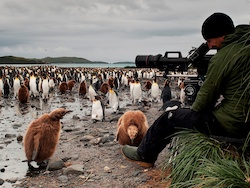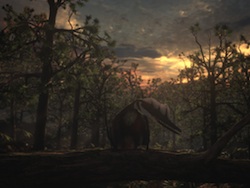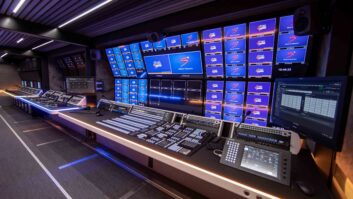Atlantic Productions’ follow up to its Bafta winning 3D doc Flying Monsters is now in post production. Anthony Geffen, founder of Atlantic Productions, talks to TVBEurope about the shooting of narrative documentary The Batchelor King on location in South Georgia. “We wanted to tell another story in the wildlife area and keep pushing at the boundaries of 3D so we began working with Sir David Attenborough again to find a place he was passionate about,” Geffen explains. “That dramatic location was South Georgia in the South Atlantic. Atlantic posted a 17-strong crew to the island for six months, for most of which they had to sleep onboard a ship since camping overnight was prohibited. The production shot on SI2Ks and Reds with Optimo zooms mounted on Element Technica Neutron and Quasar rigs. “We realised we had to be self contained, although we satellited bits and pieces back and forth; we had the whole unit back on the boat, including large screens for review, not small monitors,” says Geffen. “The logistics also necessitated the adaptation of the camera system since each day they had to carry the 560kg rig off the boat and over some very tough terrain.” The team built an underwater housing big enough to contain the Quasar, which unfortunately cracked at depth for another to be built and sent on a three-week trip by sea from the UK. “No-one knew how the housing would react at that depth with that weight – and we reached its limits,” says Geffen. “We storyboarded the entire shoot simply because every time you move equipment across ice you have to know the shot you are going for. We weren’t trying to make The Blue Planet but trying to make a very specific story. It may be that the whole way we make documentaries, and wildlife docs in particular, changes in 3D because you can’t be sitting there for weeks and run and gun shooting is also impractical.” Fortunately penguins are creatures of habit and Atlantic’s judicious choice of subject meant that individual and group behaviour could be predicted with some degree of certainty. The colony of penguins in South Georgia were studied by a team of scientists prior to shooting in order for the script to take shape. “We were in the right places, enough of the time to get some very detailed behaviour on film including tiny nuances of movement which are very expressive,” says Geffen. “We were not trying to humanise them, but there’s no doubt that penguins, as they grow up, exhibit many traits recognisable in human adolescents. People have likened it to March of the Penguins on steroids, but this is different. Storytelling in 3D does allow you to get inside their world and story like no other media. There are some really dramatic moments such as when petrols (birds) try to attack penguin eggs and you are right there in the middle of the scene.” The film is being made for Sky 3D as well as cinema and IMAX which presents its own framing issues. “The details have to be right in every single shot to make it work,” says Geffen. “The SI-2K rig is easy to manoeuvre than the big Quasar beast but you don’t get full 4k res from the 2ks which we need for the big screen. But it is very easy to get caught up in the technology when the focus for us is on the storytelling. 3D at this level is as complicated as a major movie. The kit and cameras need constant adjusting, since they are designed to work in downtown LA or London, not remote South Georgia. “3D is an opportunity to do things differently, to push the medium on and work out how it can be done better,” he adds. “In some respects 3D is about unlearning some of the things we have learned in 2D.” The show will be onlined on Mistika at Onsight for a TX on Sky in December. Geffen says Atlantic has 3D productions mapped out for the next 2-3 years ranging from natural history, live and history programming. “We are tackling a number of different genre and test shooting those. We need to know it works before we do it so we tend to be a long way out in our planning. It’s great to be acknowledged with a Bafta (for Flying Monsters) but there is a long way to go with this media. There are things we couldn’t do with 2D storytelling and we are just learning what those opportunities are, and making the economic models work.”
Shooting penguins in South Georgia
Atlantic Productions' follow up to its Bafta winning 3D doc Flying Monsters is now in post production. Anthony Geffen talks to TVBEurope about the shooting of narrative documentary The Batchelor King on location in South Georgia.




